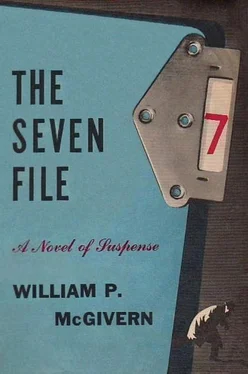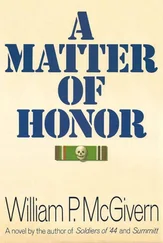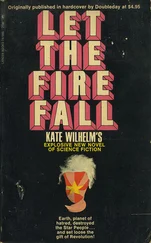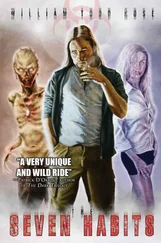William McGivern - The Seven File
Здесь есть возможность читать онлайн «William McGivern - The Seven File» весь текст электронной книги совершенно бесплатно (целиком полную версию без сокращений). В некоторых случаях можно слушать аудио, скачать через торрент в формате fb2 и присутствует краткое содержание. Город: New York, Год выпуска: 1956, Издательство: Dodd, Mead & Company, Жанр: Криминальный детектив, на английском языке. Описание произведения, (предисловие) а так же отзывы посетителей доступны на портале библиотеки ЛибКат.
- Название:The Seven File
- Автор:
- Издательство:Dodd, Mead & Company
- Жанр:
- Год:1956
- Город:New York
- ISBN:нет данных
- Рейтинг книги:4 / 5. Голосов: 1
-
Избранное:Добавить в избранное
- Отзывы:
-
Ваша оценка:
- 80
- 1
- 2
- 3
- 4
- 5
The Seven File: краткое содержание, описание и аннотация
Предлагаем к чтению аннотацию, описание, краткое содержание или предисловие (зависит от того, что написал сам автор книги «The Seven File»). Если вы не нашли необходимую информацию о книге — напишите в комментариях, мы постараемся отыскать её.
The Seven File — читать онлайн бесплатно полную книгу (весь текст) целиком
Ниже представлен текст книги, разбитый по страницам. Система сохранения места последней прочитанной страницы, позволяет с удобством читать онлайн бесплатно книгу «The Seven File», без необходимости каждый раз заново искать на чём Вы остановились. Поставьте закладку, и сможете в любой момент перейти на страницу, на которой закончили чтение.
Интервал:
Закладка:
“I’ll try my best.” Mrs. Jarrod drew a deep breath. “Well, for one thing she thought he must have kissed the Blarney Stone. He was full of smooth talk, about how beautiful she was and all like that. A chatterbox — but an amusing one, she said. He was big and good-looking, with dark hair and dark skin. He was Irish, she mentioned that for sure. Talked about his father over there, she said. And what else now?”
Mrs. Jarrod frowned at the floor, and Crowley said nothing. “I can’t remember anything else,” she said at last.
“What was wrong with the phones?”
“Ah, that’s it. Nothing at all. They were all right. He went through the house, checking the wires and all, downstairs and upstairs, and then went off. Said it was probably somewhere else in the block.”
“This could be important. Keep thinking about your talk with Kitty. Something else might occur to you.”
“Ah, there was another thing. He was hurt in the war, he told her. He had a limp in his leg.”
This last bit dampened Crowley’s enthusiasm slightly, it didn’t seem likely that a man with such memorable characteristics would be used on the inside part of the job. The breezy line of chatter also seemed out of place. He wouldn’t be calling attention to himself that way; he would slide in and out as inconspicuously as possible...
As Crowley pushed through the swinging doors of the kitchen he saw a slim young woman in mules and a blue robe standing with Dick Bradley at the living-room fireplace. He hesitated, suddenly conscious of his shirt-sleeves, his day-old beard, the gun in the holster at his hip. This would be the mother, he thought. Ellie Bradley. He hoped they had told her why he was here. Although they were not facing each other, he wasn’t sure that she had seen him; her eyes were unrevealing shadows in the whiteness of her face. Even without make-up though, he saw that she was chic and elegant, with thin classic features in the fashion magazine style, and a cap of sleek yellow hair.
She put a hand suddenly on her husband’s arm. “Dick,” she said, and Crowley knew that she had seen him; instinctively she had crowded close against her husband.
“It’s all right, dear, don’t be upset.”
“Who is he?” Ellie said, and there was a tremor of hysteria in her voice.
Oliphant Bradley was standing a few feet from them, tall and straight and handsome, his appearance a tribute to healthy living, a number of active interests, and a very good tailor. He had been born to a tradition of duty, trained to make the unpopular decision and stick by it. But yesterday he had done what he felt was right, and now he was nervous and uncertain as he stared at the growing fear in Ellie’s eyes.
“My dear,” he said, making placating little gestures with his hands. “Ellie, my dear, it’s quite all right.”
The fools, Crowley thought. They might have spared her this...
“Who is he?” she cried, clinging to her husband’s arm.
“My name is Crowley, Mrs. Bradley. I’m an agent of the Federal Bureau of Investigation. We’re working to bring your baby back home safe and sound.”
She shook her head slowly, as if he had just told her a preposterous lie. “That can’t be,” she said, in a soft puzzled voice. “They told us not to call the police. They said they’d kill our baby if we called the police.”
Dick Bradley held her close to him. “Honey, honey, everything is all right. We stand a better chance with the FBI.”
“But they told us not to call them.”
“We need help to find the men who kidnaped her.”
“I don’t care about them!” she cried. “I want my baby back!”
“Please, honey. Hang on to yourself. Father thought it was smarter to call in the police. It seems—”
She twisted herself from his arms with convulsive strength. “Your father,” she said, shaking her head slowly. “No, no,” she said. “No, Dick.”
The old man cleared his throat. “Ellie. I acted hastily, I admit that. I should have consulted with Dick. But time was precious, and I thought—”
“Stop it, stop it!” she cried, pressing her fingers to her temples.
“I acted with your interests at heart. You know that, Ellie.”
“How could you do it?” She shook her head desperately. “It’s Jill who’ll suffer. How could you do this to us?”
“My dear—”
“Oh, but it was easy for you, I’m sure,” she cried, turning on him with cold, deliberate fury. The change in her expression was sudden and shocking; she looked dangerous then, savage and pitiless, her eyes shining oddly in the marble-whiteness of her face. “You thought it was all for the best,” she said, in a low, trembling voice, “so that settled it. It’s my baby who is gone. She may be dead now, or crying for comfort and attention. It was our right to decide what to do. But you took over as you’ve always tried to do, with your college funds, and plans for schools and summer vacations and trips abroad. Only this time it’s her life—”
“Ellie!” her husband said hoarsely.
She ignored him; her dark, shining eyes were fixed on the old man. “If she’s killed will you still think you acted for the best?”
Crowley knew that nothing he could say would help the situation. She wouldn’t trust him or believe him; he was the law, the symbol of the new threat to her child. But changing the direction of her anger might help to dissipate it.
“Mrs. Bradley, the chances of getting your baby are better with our help,” he said. “A hundred trained men are working for you now. And a thousand more will be used if they’re needed. They know their jobs. They don’t often fail.”
She turned slowly to face him, and there was a touch of wonder in her eyes. “Yes, that’s how you would think of it,” she said. Then tension was gone from her body, her arms hung straight at her sides and she seemed hopelessly weary and despondent. “Winning and losing,” she said, in a soft, empty voice. “Keeping score. Put the losses in one column, the wins in another. And then add them up at the end of the year.”
Her husband touched her arm tentatively but she turned away from him and leaned against the mantel. From there she could see the dining room, cheerful and bright with the morning sun. The breakfast things were still on the table; silver creamer and sugar bowl, the jam pot. crumpled-up napkins. The Bradleys had breakfasted as usual, she thought, stifling a giddy impulse to laugh. That’s what breeding did for you, taught you to be orderly, taught you to keep busy...
Crowley saw that she was ready to break. He caught young Bradley’s eye. “Take her upstairs,” he said.
Bradley started at his tone. “Yes. yes, of course. Come on, honey, you need to rest.”
“Is that what I need?” she looked at him thoughtfully, as if she were memorizing his features.
“I’ll take you up to your room.”
“I can manage, thanks.” She crossed the room and went slowly up the stairs. The men stood in an uncomfortable silence, avoiding each other’s eyes.
“She’s very tired.” Oliphant Bradley said. He looked suddenly old and vulnerable. “I think — I believe she’ll feel differently when she’s rested — when this is over, that is.”
“I wonder,” Dick Bradley said.
It’s hardest on him, Crowley thought. He doesn’t have what she needs. It’s a tough thing to find out. If this hadn’t happened he probably wouldn’t have known...
“She was right,” Bradley said, staring at his father. “It was our decision. I didn’t have the guts to tell you that.”
“You’d have done the same thing, son. In my place you would have acted as I did.”
“I hope to God I wouldn’t. I hope I can let my children think for themselves. You can’t obviously. We didn’t want the FBI. Jill’s chances are better without police interference.”
Читать дальшеИнтервал:
Закладка:
Похожие книги на «The Seven File»
Представляем Вашему вниманию похожие книги на «The Seven File» списком для выбора. Мы отобрали схожую по названию и смыслу литературу в надежде предоставить читателям больше вариантов отыскать новые, интересные, ещё непрочитанные произведения.
Обсуждение, отзывы о книге «The Seven File» и просто собственные мнения читателей. Оставьте ваши комментарии, напишите, что Вы думаете о произведении, его смысле или главных героях. Укажите что конкретно понравилось, а что нет, и почему Вы так считаете.











